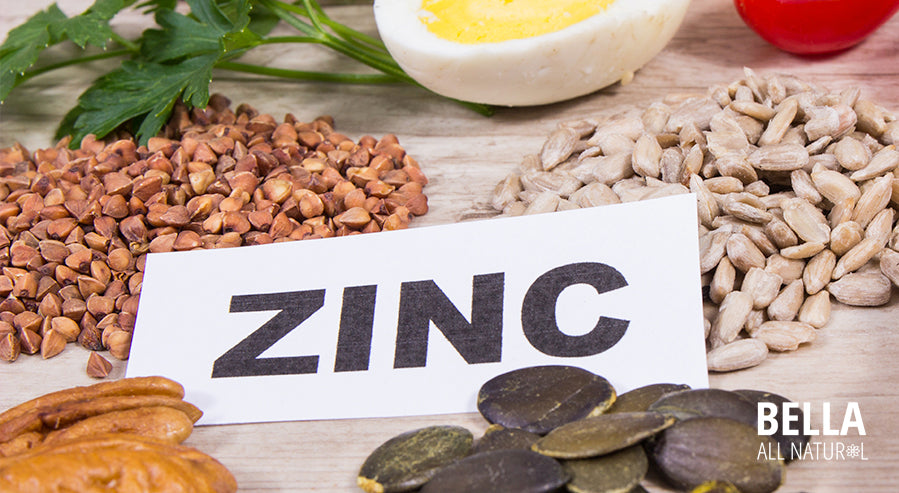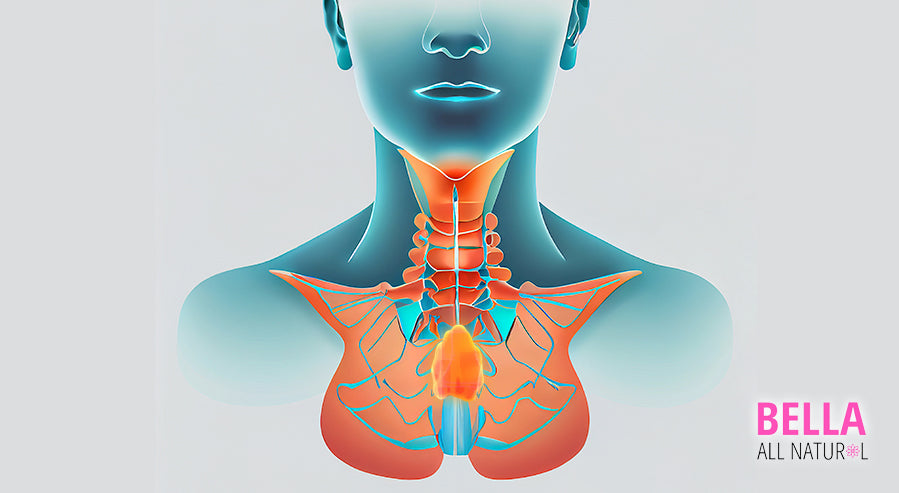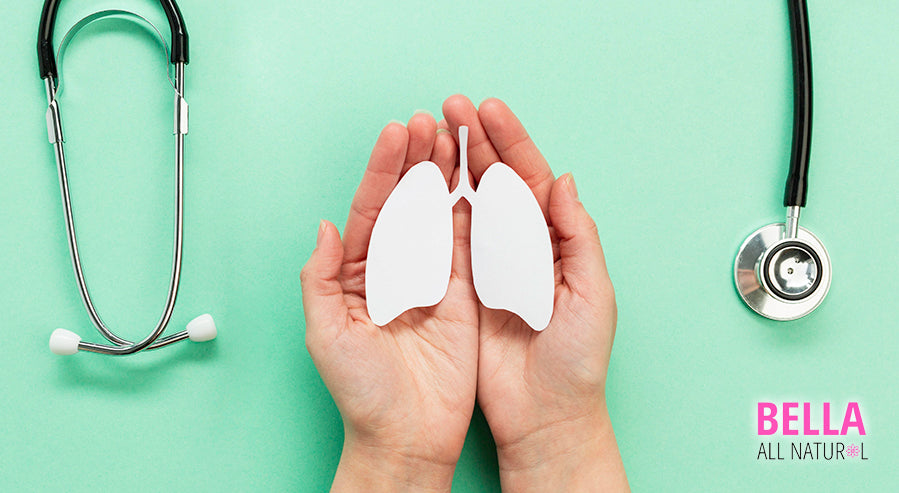

Have you ever found yourself in the health supplement section, looking at lines of shiny containers and wondering if any of them could really strengthen your immune system? Believe me, you're not the only one. Among these bottled promises, zinc often stands out the most.
Is it all just fancy talk? Or does this simple mineral have some kind of hidden strength?
You have probably heard that zinc helps your immune system work or seen people eating zinc candies quickly at the first sign of a cold. What's the real story behind the benefits of zinc? How does our body use this important nutrient to fight off bad germs?
Let's explore everything about "Zinc." We are going to discover how having enough of it can protect you from harmful germs and even common cold symptoms. We will find out why it's so important to make sure you are getting enough of it for your overall health - it helps make more thymus cells and supports lung health.
Zinc and Immune Function
Zinc plays a big role when it comes to the body's protective system. Think about it: it shapes the growth of other cells that defend you, taking part in how the cells wake up and talk to one another.
Now let's look at what T cells are - they're like superheroes inside us that can fight off sicknesses. Exactly how these cells work is affected by how much zinc we have in our bodies. Low levels could make these cells work less efficiently and make our thymus gland - which is where these cells grow up - smaller.
If you look at a study conducted on mice, giving them more zinc made their immune systems bounce back quicker, along with improvement of the thymus gland. This suggests that keeping your zinc levels up could be what your immune system needs to get a little lift.

Next up are cytokines – here's how to understand them. Imagine them as little runners that carry messages to other cells, mostly when other cells need to swing into action because of swelling, infections, or injuries. Zinc can control how much cytokines we make, and it does the job pretty well.
This makes sure everything is balanced. Believe it or not, balance is key. Because you don't want too much swelling, but you want just enough to heal when needed.
Put simply, it could be a good move to take a zinc supplement of good quality. It could help the normal growth of these important parts of your protective system while also making sure the signals between them work well, just like a machine that's running smoothly.
Always remember, this isn't a substitute for advice from your doctor. You should definitely talk to a professional before starting any new supplement routine.
The Role of Zinc in Thymic Regeneration
Zinc may not seem that important for our health, but trust me, it actually is. This little yet strong helper is important for regular growth and development. I mean, it helps in making your thymus new again.
Now, what's a thymus? Well, it's a gland that's important for your immunity. It develops T cells - the fighters in our bodies that battle infections. But there's a catch. Things like getting old or stress can make the thymus smaller and affect how it works. But there's good news. Studies show that zinc helps make this important gland new again.
One specific study showed how zinc is related to BMP4-dependent paths in the thymus that allow it to regenerate. The people conducting the study found higher levels of BMP4 during times of active regeneration.

So what's BMP4? It's a substance that helps direct stem cells into mature cells. It also plays a big part in various tissues' repair processes after they've been injured.
In other words, you can think of BMP4 as your body's repair boss on a site after some disaster – guiding all the workers (cells) about what needs to be fixed first.
All this led the scientists to another exciting area involving GPR39 - a receptor activated by zinc. Turning on GPR39 showed promise as a potential strategy for making immunity stronger through the renewal of the thymus. Now, isn't that interesting?
To put it simply, if your body was an orchestra playing life's song, then every instrument would have its specific part to play, none unimportant, although some are louder than others. In a situation like this, we could think of zinc as the conductor. It not only guides cell growth and development but also helps in the repair and recovery of important organs like the thymus.
But maintaining your zinc levels just right can be difficult. You could be eating the wrong food or be facing some health problems. This is why it's absolutely necessary that we watch our zinc intake, making sure that we have neither too much nor too little.
Understanding Zinc Deficiency
Zinc shortage is an issue related to diet, and it can seriously harm your health. This problem is mostly found in developing countries, but some people (like those who only eat plant-based food and those who drink a lot of alcohol) are also at risk.
Zinc is a tiny but very important mineral that our body needs for a lot of different things. We need to make sure that we get enough of it. If you don't have enough zinc, it can weaken your immune system and make other parts of your body less healthy.
If people don't have enough zinc, they may not feel hungry, their cuts might not heal as fast, they could feel slow in their thinking, and their sense of taste or smell can weaken. But what's even worse is that they could catch sicknesses more easily because their bodies aren't as good at fighting them off.

Eating right is the first step you should take if you think you might not be getting enough zinc. Foods that have a lot of zinc are red meat, seafood like crabs and shrimp, beans, and seeds. If you're still not getting enough through your diet, you can also take a supplement. But you should always definitely speak to a doctor before starting to take a new supplement. Just remember, it's important to not take too much zinc because that could also cause problems. You need to find the right balance. Maybe, after all, as the National Institutes of Health advises, balance is the key to zinc intake.
Basically, to put it simply, making sure you have enough zinc, but not too much, is an important part of staying healthy. Why not start checking your zinc levels today? Believe me, it's pretty easy. You know, a little more attention to this could go a long way.
In any case, ensuring proper zinc intake is an essential aspect that shouldn't be overlooked. For the most part, it's about finding a balance of zinc in your diet. So, remember to keep this advice in mind.
Ensuring Adequate Intake of Zinc
The RDA of zinc is contingent on age and gender; for instance, men require 11 mg of zinc daily, while women need 8 mg. But how do we ensure that our body gets enough?
Finding rich sources in your daily diet is the first step towards maintaining optimal levels of this crucial mineral. Oysters top the list with more than double the amount of zinc needed for adults. Other good sources of zinc include beef and chicken, legumes, nuts, whole grains, shellfish like crab and lobster, and dairy items.

For those following a vegetarian or vegan lifestyle, though, getting enough zinc can be a bit challenging because these diets tend to contain less bioavailable zinc that our bodies can use easily. However, fear not. There are still plenty of plant-based foods high in zinc, such as legumes, seeds (especially pumpkin seeds), tofu, and oatmeal.
Sometimes, meeting your needs through food alone might be difficult due to dietary restrictions or other health issues that may hinder absorption. In these cases, taking supplements could provide extra help by ensuring an adequate intake level.
If you decide to go down this route, remember it's important not to exceed the tolerable upper intake level (UL) set at 40mg for adults by the National Institutes Of Health. This includes both food and supplement intakes.
Pregnant or nursing mothers should consult their care providers before starting any supplementation program since their requirements change during these periods. The recommended dietary allowance for pregnant and nursing women is slightly higher at 11mg and 12 mg of zinc, respectively.
In conclusion, whether you get your zinc from food or supplements, the key to reaping its immune-boosting benefits lies in maintaining adequate levels. It's a balancing act of ensuring sufficient intake without going overboard. Always remember that while it's an essential trace mineral crucial for many bodily functions, including immunity, too much can lead to toxicity.
Zinc's Role in Respiratory Health
Zinc is pretty important when you're fighting a respiratory problem like a regular cold. But how does this little thing help you out? To put it simply, let's get into it.
Zinc has a track record of reducing both the duration and severity of cold symptoms. Research shows that if you take zinc within 24 hours from when your symptoms first pop up, zinc could cut your cold's time by about a day. So, less time feeling sick and more time for what you love to do.
And it doesn't stop with just stopping colds. Zinc helps our body's natural defense cells - these are critical parts of our immune system that fight viruses and other harmful stuff. If your diet has enough zinc or you're taking zinc supplements, these natural defenders get even better at their job.
The link between having enough zinc and having fewer respiratory infections is so clear that some experts claim we need to think about it when planning public health actions - especially when there are a lot of viral diseases going around.

Making use of such benefits may be easier than you think. Sucking on zinc lozenges during a cold could speed up getting better by bringing zinc right to your throat, where many viruses start before moving further into your body.
But it doesn't even stop with common colds. Having enough zinc may help prevent more severe respiratory sicknesses, like pneumonia, especially in people who don't have a lot of this important mineral in their diets.
So, at the end of the day, having enough zinc is a sure way to keep your immune system strong and ready to stand up to any harmful stuff -- particularly the kind that causes respiratory problems.
Additional Health Benefits of Zinc
Zinc is famous for helping your immune system, but it also does a lot more for your health. Now, let's explore some of the other great things zinc can do.
Zinc helps wounds heal faster. It does this by helping cells split and grow, which is important for fixing damaged tissue. Yep, this great mineral speeds up the healing of wounds by assisting in cell splitting and growth - steps that are key for mending tissue. So, it's not shocking that zinc is often in creams used for things like diaper rash or skin issues.
Heart disease keeps being a top cause of death all around the world. But there's some good news - having enough important minerals like zinc in your body might help to keep your heart healthy. Studies show that getting enough of this mineral could help manage high cholesterol levels by increasing HDL (the "good" cholesterol). Now, doesn't that sound interesting?

Next, I want to talk about another perk – eye health. You might be a little surprised at this point because who would have thought about eye health and zinc being linked? However, research hints at this being the case.
There's an issue called age-related macular degeneration that slowly damages the sharp vision you need for things like reading or driving, and it's common in older people. But, believe it or not, the National Institutes of Health has seen possible ties between eating foods with antioxidants like zinc and slower progression of this issue.
Last on the list, let's remember how zinc affects growth. Zinc assists normal growth and development during pregnancy, childhood, and the teenage years. It plays a major part in cell division and building DNA – steps that are key for body growth.
But just a reminder, everyone, zinc is really important for being healthy. Still, like everything else in life, too much of it can cause problems like feeling sick or even a weaker immune system. So, it's definitely vital to maintain a good balance.
Keep It All Natural!
Can zinc really enhance your immune system? Absolutely! Zinc is a true champion for our immune defenses, aiding in the generation of infection-combating T-cells and fostering thymus rejuvenation.
Well, you see, a careful balance is pretty much needed, without too much or too little. An easy way to stay healthy is to eat well or take vitamins. This helps to fight common sicknesses like the cold. Trust me, this simple mineral does more. It also helps wounds heal quicker and keeps your heart strong. But, you know, using too much can be dangerous. So, checking your zinc levels is important. Making sure you get enough, but not too much, is key for staying healthy.

At Bella All Natural, our firm belief revolves around nature being the source of life's finest solutions. This conviction is what drives us to develop all-natural products to boost our well-being and physical aesthetics. Our Turmeric & Ginger Powder stands out among wellness shots. Simply combine it with water, and voila - an immediate wellness shot is ready. Pay us a visit online and experience our products for yourself. Whatever path you choose, though, always remember to keep it All Natural!



